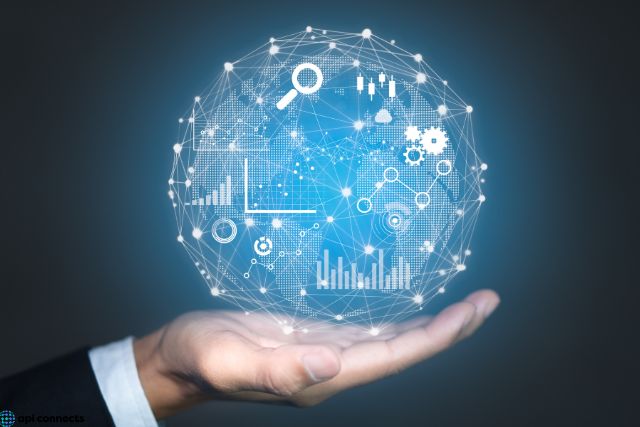Businesses across all industries collect vast amounts of data but the real power lies in how this data is used. Business intelligence and data analytics are the two terms that often come up in this context. Understanding the difference between business intelligence and data analytics is critical for making informed decisions, investing in the right tools, and driving strategic growth.
In this article, API Connects – trusted globally for data engineering and analytics – will break down the definitions, goals, tools, use cases, and key differences between business intelligence and data analytics. Let’s start by understanding the meaning of both!
Business Intelligence: Meaning
Business intelligence refers to the technologies, processes, and practices that help organizations collect, integrate, analyze, and present business information. It helps businesses support better decision-making for future growth.
Business intelligence (BI) is used to showcase historical data (what is happening and what has happened). The major focus of business intelligence is on dashboards, reporting, data visualization, and performance tracking. Business intelligence tools provide a clear overview of the current state of the business to executives and managers. Here are the key components of business intelligence:
- Data warehousing
- ETL (Extract, transform, load)
- Dashboards and reporting
- Querying
- Data visualization
Below are some of the major tools of business intelligence:
- Microsoft Power BI
- QlikView
- Looker
- Tableau
- SAP BusinessObjects

Now that you have an idea of business intelligence, let’s get familiar with data analytics.
Data Analytics: Meaning
It is the process of examining data sets to find trends, patterns, correlations, and insights that can support informed decision making. Data analytics encompasses a broader range of techniques including descriptive, diagnostic, predictive, and prescriptive analytics.
Data analytics is more advanced than BI and often uses complex algorithms, statistical models, and machine learning to derive insights. It doesn’t just tell you what happened but also why it happened and what will happen. Here are some of the major types of data analytics:
- Diagnostic analytics
- Descriptive analytics
- Predictive analytics
- Prescriptive analytics
Below are some of the popular data analytics tools:
- Python and R
- SQL
- Apache Spark
- SAS
- Google BigQuery
Interested in reading more about technology? Here’s some of our recommended blogs:
Patch management best practices
Common DevOps and IT infrastructure problems
Network detection and response: A quick guide
Legacy application modernization
Business intelligence vs. data analytics: Use cases
Now that we have an idea of the major differences between business intelligence and data analytics, let’s get familiar with some examples to learn more about it.
Retail Business: Example 1
Business intelligence case: A retail company uses a business intelligence dashboard to monitor sales performance by region, product category, and customer segment. It allows executives to view daily sales, track KPIs, and generate monthly reports.
Data analytics use case: The same company uses predictive analytics to forecast future sales trends based on historical data, customer behavior, and market trends. This allows for optimized inventory management and targeted marketing.
Healthcare: Example 2
Business intelligence use case: A hospital uses business intelligence tools to monitor patient admission rates, staff performance, and financial operations.
Data analytics use case: Data analysts use machine learning models to predict patient readmission risks, personalize treatment plans, and optimize resource allocation.
BI vs. Data Analytics: Suitability
Businesses put their trust on business intelligence when they:
- Need real-time insights into current business performance.
- Dashboards and periodic reports are critical
- Want to improve operational efficiency and monitor KPIs.
- Have professionals with limited technical expertise.
- Need to aggregate data from different departments in a simplified manner.

While BI is critical for businesses, it doesn’t cover everything. Data analytics is more suitable when businesses:
- Want to uncover deeper insights and answer why and what-if questions.
- Have teams that include data scientists or analysts with technical skills.
- Want to build predictive models or use AI/ML for decision-making.
- Are dealing with large, complex, or unstructured datasets.
- Want to experiment, innovate, and drive strategic transformation.
Business Intelligence VS Data Analytics: Wrapup
We hope that the above article helped you learn everything about business intelligence and data analytics. Understanding the differences between the two allows organizations to build a comprehensive strategy for using data effectively.
API Connects have the engineering talent to support your organization with both Business Intelligence as well as Data Analytics. Email us on enquiry@apiconnects.co.nz to discuss your technology goals.
Check out our other popular services as well:
Integration services in New Zealand
DevOps services in New Zealand